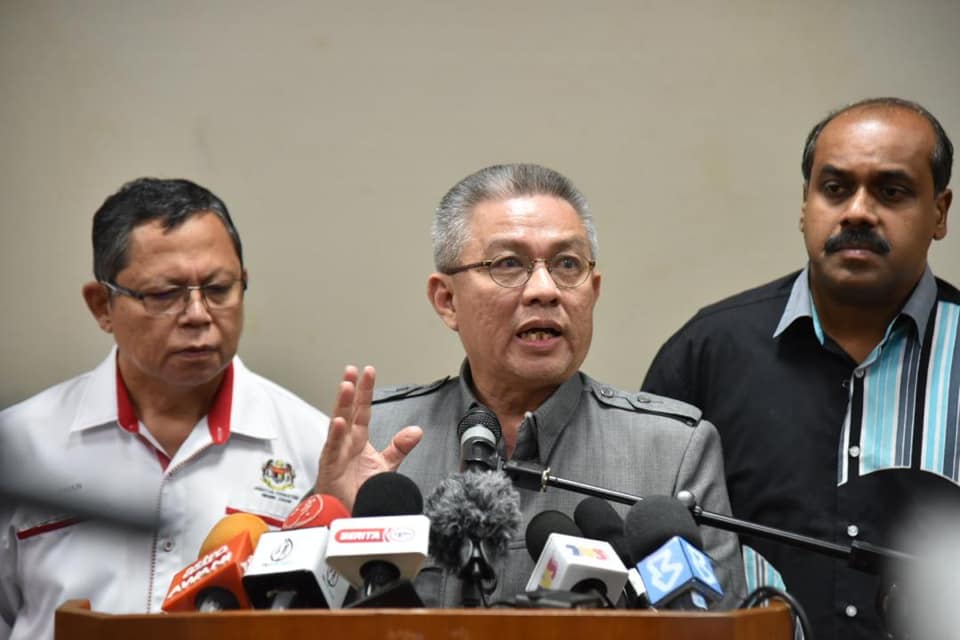KUALA LUMPUR, March 20 — It is too early to say that Malaysia’s coronavirus outbreak is plateauing, experts told Health Minister Dr Adham Baba, after 900 cases were reported as of yesterday.
Two doctors pointed out that thousands who attended the recent tabligh gathering at the Sri Petaling mosque, which accounted for the majority of Malaysia’s Covid-19 infections, have yet to be tested. Almost 2,000 participants are awaiting their test results, while some 4,000 have not been tracked by health authorities.
The experts also said Malaysia’s social distancing has yet to take effect and that the botched rollout of the Movement Control Order (MCO) on March 18 — which saw people crowd bus stations and police stations to travel back to their hometowns — only served to spread the coronavirus out from the epicentre in the Klang Valley. This may only bring an impact in three to four weeks’ time.
“We should not let down our guard because there’s no reason from our curve to think we will behave differently from Italy or other countries,” senior paediatrician Dr Amar Singh-HSS told CodeBlue.
“We are not doing what South Korea did (extensive testing of all contacts with strict physical distancing). We test only symptomatic contacts. At least 50 per cent are asymptomatic and important spreaders, from China and Italy data,” he added.
Health Minister Dr Adham claimed yesterday, just the second day of the national partial lockdown, that Malaysia’s Covid-19 outbreak is “plateauing”, attributing it to the MCO, even though authorities yesterday reported the fifth consecutive day of new infection increases above 100 cases.
Dr Amar pointed out that on average, each positive case has at least 40 to 60 contacts (but Malaysia only tests symptomatic ones).
“Right now, if we only confine our testing to contacts of cases, we will miss many more out there as it is spreading in the community.”
Dr Amar-Singh HSS, paediatrician
South Korea’s coronavirus growth rate has significantly slowed, according to media reports, after the government quickly implemented a mass-scale testing regime, testing 250,000 people for free at over 600 testing sites nationwide, including drive-through clinics and pop-up facilities, since its outbreak started on January 20. South Korea has conducted 3,600 tests per million people.
Al-Jazeera reported that South Korea has been transparent about Covid-19 information, giving people alerts on their mobile phones about nearby infection paths so such areas can be avoided. The South Korean government also created a GPS-enabled app to monitor people under quarantine who will set off an alarm if they go outdoors.
Malaysian health authorities, in contrast, had long resisted giving the public information about infected locations ever since the first coronavirus case was confirmed here on January 25. The Ministry of Health (MOH) only started releasing the number of cases in each state on March 13. after the tabligh cluster exploded.
It is also unknown how many people Malaysia has tested for Covid-19; Dr Adham has not answered media questions about Malaysia’s testing strategy or how many test kits are available. The Chinese embassy said yesterday that China will be donating 3,500 coronavirus laboratory test kits that will arrive in Malaysia next week, besides contributing 100,000 three-ply face masks.
The health minister also has not given any information on other coronavirus clusters, besides the tabligh one, or the preparedness of Malaysia’s health care system for a possible Covid-19 surge, besides merely announcing the number of new infections every day.
Dr Amar noted that Malaysia’s national partial lockdown did not have the same quality as the lockdown in Wuhan, where the novel coronavirus originated from in China, as Malaysians were still moving around.
“Our national ILI (influenza-like illness) surveillance suggests 1.7 per cent of viral respiratory illness are Covid-19, suggesting community spread.
Paediatrician Dr Musa Mohd Nordin said Malaysia has a backlog of thousands of people from the tabligh cluster yet to be accounted for in the official daily tally of new Covid-19 infections, plus thousands more from the gathering who are not traceable and are out there in the community infecting others.
“This is premature optimism,” Dr Musa told the health minister.
“Our social distancing has yet to take effect. If anything, the mayhem at the rollout of the programme only served to drive the spread of Covid further.”
Dr Musa Mohd Nordin, paediatrician
He also questioned the seriousness of Covid-19 patients’ conditions, noting that these would be especially taxing on Malaysia’s intensive care unit (ICU) facilities as ICU facilities are virtually functioning at 90 to 95 per cent bed capacity for non-coronavirus cases.
“There is not much more ICU bed capacity to serve the burgeoning Covid cases. It would be interesting to learn the daily demands of Covid cases on our ICU beds,” he told CodeBlue.
He noted that Malaysia’s critical Covid-19 cases comprise about 2.2 per cent, at 20 out of 900 infections, while figures in other countries hover at around 5 per cent.
Benjamin Cowling, professor of infectious disease epidemiology, University of Hong Kong, told BFM last Tuesday that the fortnight-long duration of Malaysia’s MCO is not going to be enough, stressing that mitigation measures must be sustained.
“You’re not even going to be reaching the peak in two weeks’ time. The peak is probably four, six or eight weeks away. If you slow that down with mitigation measures, it might even be 12 weeks away.
“But you need to keep the measures going. Otherwise, you’re going to have a surge when the measures stop,” he was quoted saying.








